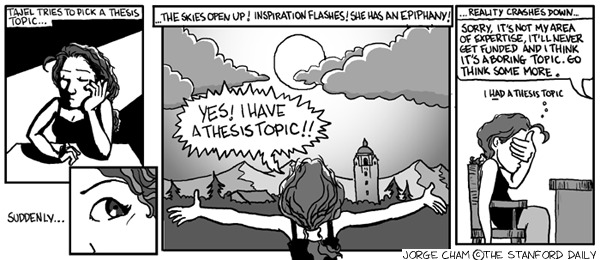Hi there!
I have recently concluded my Masters Dissertation about Control and Management Mechanisms for 5G Networks, with a 20/20 grade :) (in Portugal, the grading system goes from 1 (F) to 20 (A+) )  ). While for me it was a smooth ride, for many of my colleagues it was/is really challenging to do their dissertation (or thesis, depending on the country you are studying). In this blog post, I will summarize the tips I would give myself before starting the dissertation, explaining my good and bad decisions along the way.
). While for me it was a smooth ride, for many of my colleagues it was/is really challenging to do their dissertation (or thesis, depending on the country you are studying). In this blog post, I will summarize the tips I would give myself before starting the dissertation, explaining my good and bad decisions along the way.
Obviously, the content of this blog post is highly subjective and related to my dissertation experience, so don’t take it as the ground truth. But do think critically about my advice and, whether you agree with them or not, comment on what you think about it (I will number the tips for easy reference). Although this post is about a Masters Dissertation, it can also be (loosely) applied to a PhD work. But do note that I did not do a PhD: think critically whether this applies to you or not.
This post will be divided into four parts:
- I - 3 tips for before starting the writing of the dissertation;
- II - 4 tips for during the writing of the dissertation;
- III - more 4 tips for during the writing of the dissertation;
- IV - 3 tips for after the writing of the dissertation.
Let’s start?
Before
1 - Choose the dissertation because of the supervisor or because of the dissertation topic?

Ush, this is a hot topic. Usually, some months (or weeks) before the beginning of your work, you have the chance to talk with your university Professors, to pick a topic for your dissertation. Do you start by choosing a dissertation topic and then talk to supervisors that understand that research area, or do you start by choosing a supervisor and then choose what he has to offer you?
This is a hard question. Ideally, you would like to have both: a supervisor that you get along with and a dissertation topic that you love. That is possible more times than not.
My Experience
I was already in a research group before starting the dissertation, with a research grant. To choose a dissertation topic, I just went talk to my supervisor, explained to her what I had in mind, and we came to an agreement. No, it wasn’t exactly her area of research (Machine Learning/Deep Learning), but it was of both parties’ interest to make a dissertation about that. We agreed that Machine Learning techniques were going to be used to analyze and improve 5G Networks. The supervisor could give me work revision and discussion about 5G Networks, but I was on my own on how to apply the Machine Learning techniques.
While during the writing of the dissertation sometimes I felt a little “lost” in what my approach should be, it has inspired me to learn online about the area, and to understand it better. Due to the freedom that I had and the confidence that I always felt by my supervisor on me, any setback in my work was quickly discussed, besides the usual weekly meetings. In the end, I felt that although another supervisor could have given me more technical insights, I had much more freedom, encouragement and logistical support that was essential to my great grade in the dissertation.
My Advice
I suggest going with your gut on this one. To give you an objective answer, I would say 70/30. For me, a great supervisor is more important than a great dissertation topic. A great supervisor will guarantee you 70% of your grade on your dissertation. Remember that your supervisor will be guiding you for one year (at least). You will have many meetings with him/her about the direction of your work. If you are not comfortable with him/her, or if you just don’t get along, then things can become really hard, independently of the topic of the work. What is a good supervisor? Well, that’s a topic for another post, but if you keep reading, I will give you some guidelines of what your supervisor should and shouldn’t do.
Being in love with a dissertation topic is important because you will spend a lot of time researching that topic. If you find a supervisor that you like and that accepts your dissertation topic, go for it! Otherwise, you will have to make a trade-off. But don’t forget: 70% of the importance to the supervisor, 30% to the dissertation topic.
For the PhD thesis I would NOT recommend following this approach! The PhD is a hard road for everyone, and it involves a LOT more research and background work than a Masters dissertation. You will only be able to make it to the end if you really like the topic that you’re working in. Besides, because you will spend much more time than one year working on that topic, it is expected that you become a world expert about that. If you don’t like that topic… why you’re doing a PhD anyway?
In this case, I would recommend to, before starting the dissertation, search for the world experts about the topic that you are in love with. Make a short-list: 2 or 3 supervisors. Then, get in touch with them to understand if they are interested and, more importantly, if they are the right supervisor for you. If you find one that you like, go for it! Otherwise, keep searching. And don’t be afraid of changing supervisors while you’re still in the first year. It is better to change in the first year than spend 3, 4 or more years regretting that decision.
2 - Understand the basics before diving in!
Before closing the deal with a supervisor about your dissertation, you should understand the basics of the dissertation work, mainly the objective and the techniques used to solve the proposed problem. A common problem in dissertation students is that they choose a topic just by the dissertations’ name. Beware of the “hot trends” in the industry (eg. AI, 5G, Cloud, …): a cool name does not mean a cool dissertation!
My Experience
Well, let’s say I was lucky with this one… Before the dissertation deal, I really wanted to learn more about machine learning, but I didn’t know much about it. I knew the basics about it, but I knew nothing about the internals of the algorithms used, or about model tuning. In summer holidays (after accepting the dissertation deal and before starting to work on the dissertation), I learned a lot about machine learning in three ways: free online courses, blog posts and books. Those 2 months were a crash course about machine learning algorithms and its utilization in the real world, as well as in the Deep Learning state of the art techniques. Fortunately, I loved it! At the beginning of the dissertation work, I felt a lot more confident about what to do to solve the problem, and about general knowledge about machine learning.
My Advice
Before accepting the dissertation, take an hour of conversation with the supervisor. Try to understand what are the objectives of the dissertations’ work, and what are the current techniques used (or expected to be used by the supervisor). If you think that those techniques are obsolete, discuss that with the supervisor to make sure that you will not reinvent the wheel just because your supervisor finds that interesting! If you don’t understand what are the techniques that your supervisor wants you to use, take a week to learn about them (not in-depth, at least to have a grasp and understand what type of work you will be doing). If you don’t like the techniques used, feel free to reject the dissertation work (it is better to reject than to spend a year working on something you don’t like!). After accepting the dissertation, take a more in-depth look at the techniques you will be using to solve the problem, and research for the state of the art approaches. After this (sometimes boring and time-consuming) work, you will feel much more comfortable and able to do the job.
3 - Take a break after accepting the dissertation!
Why take a break after accepting the dissertation? Shouldn’t we all start working furiously to do the work as quickly as possible? Well… NO!  The dissertation is not a sprint, it’s a marathon (more on that later). After accepting the dissertation (you usually accept it before the summer holidays), take a week to relax and think about the work you will need to do. It will require a lot of mental preparation to work a whole year in a project, especially when things go wrong. This week is not only to take in the dissertation goals and to think about them, but also to mentalize yourself that you can do it, even if things go wrong from time to time (trust me, in such a long-term work, many things will go wrong!). It is important to mentalize yourself about the task you are facing.
The dissertation is not a sprint, it’s a marathon (more on that later). After accepting the dissertation (you usually accept it before the summer holidays), take a week to relax and think about the work you will need to do. It will require a lot of mental preparation to work a whole year in a project, especially when things go wrong. This week is not only to take in the dissertation goals and to think about them, but also to mentalize yourself that you can do it, even if things go wrong from time to time (trust me, in such a long-term work, many things will go wrong!). It is important to mentalize yourself about the task you are facing.
My Experience
Before big steps in my life, I like to take a week to think about the step I am taking, to think about the future consequences of my decision and to understand how am I going to fulfill my goals. I did it before entering in my college course, and I did it before the starting of the dissertation work. Before the dissertation, I took a week to go to the Taizé Community: an ecumenical Christian monastic fraternity in France. I left my laptop, smartphone and electronic devices turned off to focus in nature. Besides, Taizé is known for its meditations and reflections, which allowed me to think deeply about why I was doing a dissertation, and it helped me to not give up in the hardest times.
My Advice
No, you don’t necessarily need to go to Taizé to take a break. But I would recommend going away from distractions, from electronic devices and from your routine. A week camping in the forest is also a good option. If you can’t be unavailable for a week, at least do it for a weekend. If you can’t or don’t like camping, you can go to a bungalow and take walks in the forest, for example. The key here is to go away from your routine. Only when you disconnect from the world you can really think deeply about what you want and how to reach it.
That’s it for today!
Thanks for sticking by. Click here for part II.
See ya!